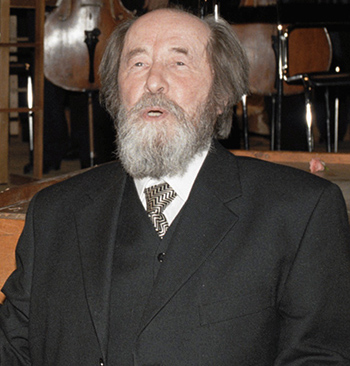With the courage and moral prestige that his condition as a dissident and victim of the Soviet Union gave him, he described the features of the so-called free world that had to be rectified in order not to fall into an unstoppable decadence. More than forty years after those words were uttered, the lucidity and accuracy of his analysis is astonishing.
After receiving the Nobel Prize for Literature in 1970, Harvard University invited the Russian dissident Aleksander Solzhenitsyn to deliver the inaugural lecture at the ancient and illustrious American university on June 8, 1978. Taking advantage of Harvard's motto ("Veritas"), the famous writer allowed himself to utter some truths before this select audience.

He began by talking about the division into pieces of the world at that time. To the two confronting worlds of the cold war, polarized around the United States of America and the USSR, he added the countries of the so-called Third World and probably more worlds. And he quoted the Bible as saying that a kingdom divided against itself cannot stand and warning against the belief in the inherent superiority of the West over other civilizations.
Taking advantage of the fact that he was addressing a Western audience, Solzhenitsyn broke down certain aspects of the West at the time that I think have sharpened into the current state of decadence. The first would be the decline of courage which manifested itself in a general cowardice in society, making inflexibility with weak governments or discredited currents, incapable of offering any resistance, compatible with silence and paralysis in the face of powerful governments and threatening or terrorist forces.
The second aspect would be the excess welfare and the desire to possess more and more things and to have a higher standard of living, which paradoxically produces in many Westerners anxiety and depression. The climate of tense and active competition dominates all human thinking and does not open any path to free spiritual development. In such an environment, who would risk his comfortable life in the defense of the common good in the event that the security of the nation itself had to be defended?
Another feature of the Western way of life would be what the Russian thinker calls the "Western way of life". the "legalistic" life. The boundaries of propriety and human rights are determined in a system of laws with very broad limits. The law is used, interpreted and manipulated with great skill. The important thing is to be covered legally and it is secondary whether one is really right or what one is doing is good or just. Solzhenitsyn states that living under a communist regime without an objective legal framework is terrible but so is living in a society with no other scale than the legal one.
The orientation of freedom in Western countries has in turn proved to be misguided. Our societies have been left with few defenses against the abyss of human decadence. All moral wrongs are considered an integral part of freedom. There has been a bias of freedom towards evil.
At another point in his speech, Solzhenitsyn also speaks lucidly about the orientation of the press and the media in general. What responsibility does a newspaper journalist have towards his readers and towards history? Precipitation and superficiality are the psychic disease of the 20th century, and this prevents deep analysis of problems.
Without any censorship in the West, fashionable trends in thought and ideas are separated from those that are not fashionable, the latter having very little chance of being reflected in newspapers or books or even of being heard in our universities. These aspects have a great impact on important aspects of a nation's life, such as education, both elementary and advanced in the arts and humanities.
We have to rise to the height of a new vision, a new level of life. It is nothing less than a climb to the next anthropological stage. No one in the whole world has a way out except one way: up.
Santiago Leyra Curiá
At the same time, many people living in the West are dissatisfied with their own society and are inclined toward socialism, which is a false and dangerous alternative. For socialism, Solzhenitsyn claims, leads to the total destruction of the human spirit and the leveling of humanity in death. But neither is the present Western society a good model for anyone. The human personality in the West has been greatly weakened while the hardships suffered in the East have produced stronger personalities.
The greatest problem of the West is the loss of will, a symptom of a society that has reached the end of its development. The origin of this decadence is found by the Russian thinker in anthropocentrism, in the forgetfulness of the human being as a creature of God, the basis of all human rights. This is the common kinship between Marxist materialism and Western materialism.
In the face of this ominous picture, which more than forty years later has proven extraordinarily lucid and accurate, the end of Solzhenitsyn's speech at Harvard University offers the solution to our problems, to rekindle our spiritual fire. We have to rise to the height of a new vision, a new level of life, where our physical nature will not be anathematized as in the Middle Ages nor our spiritual being trampled upon as in the Modern Age. It is neither more nor less than an escalation to the next anthropological stage. No one in the whole world has any way out but up.







